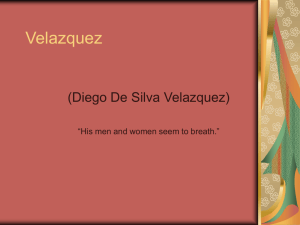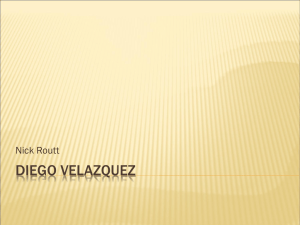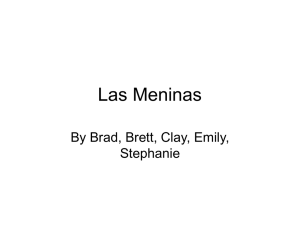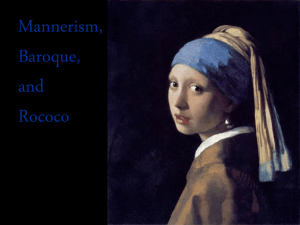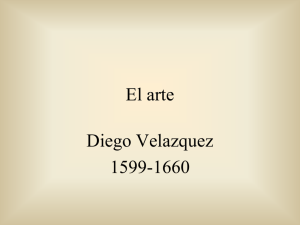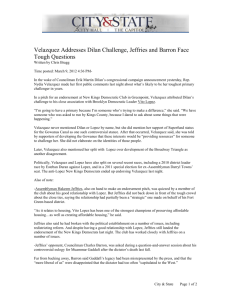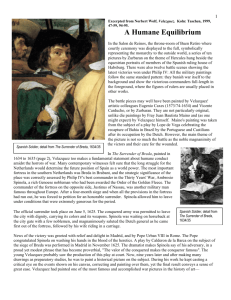Diego velazquez
advertisement
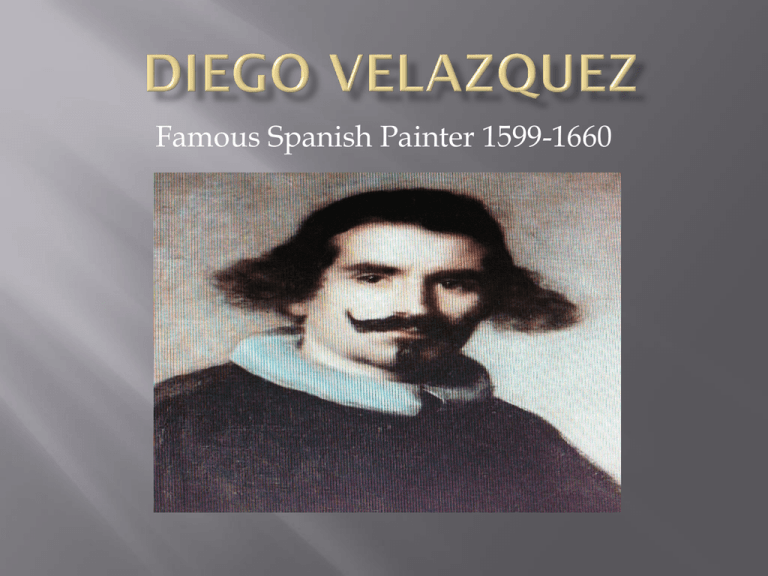
Famous Spanish Painter 1599-1660 He was born is Seville in the country of Spain. When he was about 13 years old he was apprenticed to a painter, Francisco Herrera, but the man was such a tyrant Diego only stayed with him for a year. He next went as an apprentice Francisco Pacheco who was very kind and helpful to him. He worked for him 5 years, then married Pacheco’s daughter, Juana, who gave him two daughters. With his family and his father-in-law ,Pacheco, he visited Madrid where he was asked to paint the portrait of king Philip IV of Spain who was 18 years old. The Spanish king was so pleased, he asked Velazquez to move to Madrid with his family and work exclusively for the royal family. He was the favorite of the king’s four painters. For the next forty years he and his family lived with the king. Even his mother and father lived with them. He painted at least 20 pictures of the king in all kinds of clothing. The king had a chair in the artist’s studio so he could sit and watch him paint. Velazquez used a long-handled brush so he could see how his brush strokes looked from a distance away from the Canvas. Our featured work in this lesson has been named las meninas. The “meninas” were the young daughters of nobleman’s families who waited on the young princess who was called an “infanta”. The young girl is serving the princess something in a cup. The artists with the brush in his hand in, of course, Velazquez. His special clothing shows he is a knight. If you look at the reflection in the mirror, you can see the king and queen who are apparently posing while the artist paint their picture. He was an individualistic artist of the contemporary baroque period, The baroque is a period of artistic style that used exaggerated motion and clear, easily interpreted detail to produce drama, tension, exuberance, and grandeur in painting, the style started around 1600 in Rome, Italy and spread to most of Europe. He was important as a portrait artist this genre in painting where the intent to depict the visual appearance of the subject. In addition to numerous renditions of scenes of historical and cultural significance, he painted scores of portrait of the Spanish royal family, culminating in the production of his masterpiece Las Meninas (1656). From the first quarter of the 19th century , Velazquez’s artwork was a model for the realist and impressionist painters, in particular Edouard Manet. Since that time, more modern artists, including Spain's Pablo Picasso and Salvador Dali, as well as the Anglo-Irish painter Francis Bacon, have paid tribute to Velazquez by recreating several of his most famous works. In 1929 Velazquez left for Italy and spent the next two years traveling around the country. During his time there he studied Italian art and current trends. One of the works that he produced on his travels, Joseph and His Brothers, is on display in El Escorial near Madrid. This combines the sculptural style of Michelangelo with the light and shadows techniques of many of the Italian masters. When Velazquez returned to Madrid he continued as the court painter. He produced many notable works including Prince Baltasar Carlos with a Dwarf which is on display in the Museum of Fine Arts, Boston. He also contributed to the decoration of the throne room in the new royal palace of Buen Retiro alongside some of the most famous painters of the day. His most famous piece is the battle picture the Surrender of Breda. Las Meninas is a 1656 painting by Diego Velazquez, has been one of the most widely analyzed works in western painting.
